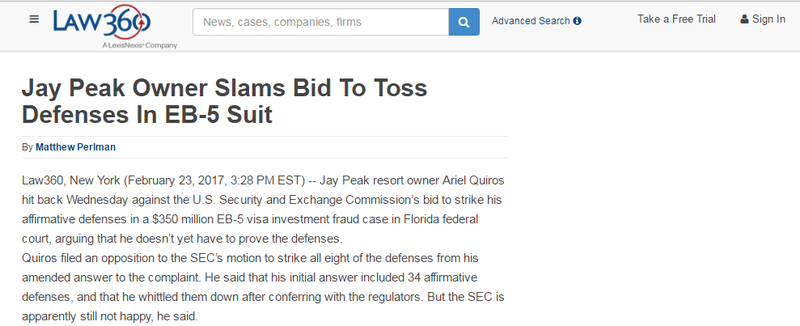Jay Peak resort owner Ariel Quiros hit back Wednesday against the U.S. Security and Exchange Commission’s bid to strike his affirmative defenses in a $350 million EB-5 visa investment fraud case in Florida federal court, arguing that he doesn’t yet have to prove the defenses.
Quiros filed an opposition to the SEC’s motion to strike all eight of the defenses from his amended answer to the complaint. He said that his initial answer included 34 affirmative defenses, and that he whittled them down after conferring with the regulators. But the SEC is apparently still not happy, he said.
“Defendant Ariel Quiros’s amended answer to plaintiff’s amended complaint alleges just eight affirmative defenses, all of which are proper,” the opposition said. “Yet, by its motion to strike affirmative defenses, plaintiff Securities and Exchange Commission — which brought a fifty-two count complaint — claims that Mr. Quiros should not be allowed to plead any of his affirmative defenses.”
Regulators filed suit in April, accusing Quiros and Jay Peak CEO William Stenger of misappropriating the bulk of $350 million raised from investors hoping to obtain visas through the EB-5 program, which provides green cards to foreign nationals who invest in job-creating American businesses.
In November, U.S. District Judge Darrin P. Gayles found that the SEC’s evidence supported a preliminary finding that Quiros had fraudulently enriched himself with investor funds and issued a preliminary injunction barring him from selling securities or managing a company that has issued securities. Quiros is appealing that order to the Eleventh Circuit.
Quiros filed his amended answer to the complaint in January, asserting affirmative defenses that he argued bar the SEC’s action, including that the agency waited too long to file suit against him, that it failed to include other parties involved and that the complaint seeks an impermissible forfeiture. The SEC filed its motion to strike in early February, arguing among other things that all of the defenses lack specificity and factual support.
The resort owner said in his opposition Wednesday that the agency misstates the pleading standard for affirmative defenses at this stage in the case, and that he’s only required to inform the SEC of what his defenses will be.
“Mr. Quiros is not required to discover the facts needed to prove his affirmative defenses at the pleading stage. Rather, Mr. Quiros is merely required to put plaintiff on notice of his defenses, which he has done,” the opposition said.
Quiros took aim at the SEC’s contention that he can’t raise a statute of limitation defense, which he said the regulators justify by pointing to the court’s preliminary injunction order and an order denying a motion to dismiss. But, he said, both of those orders expressly reserved his right to argue that the claims are time-barred.
“Indeed, plaintiff conceded that the court recognized it was ‘premature’ to decide whether the statute of limitations barred its disgorgement remedy,” the opposition said. “Thus, it is preposterous for plaintiff to now argue that the court’s preliminary treatment of this affirmative defense forever bars Mr. Quiros from raising it.”
He also said that there’s no basis to strike his argument that the SEC’s claims are barred because it failed to join financial services firm Raymond James & Associates Inc. in the suit, despite knowing it was involved. Quiros said the receiver in the case even filed suit against the company.
He also pushed back against the SEC’s contention that he can’t claim the suit is seeking an impermissible forfeiture since it’s actually looking for disgorgement, calling the argument “another attempt to use semantics to preclude Mr. Quiros from defending himself.”
A trial is scheduled in the case for Sept. 17, 2018.
Representatives for the SEC and attorneys for Quiros did not immediately respond to requests for comment on Tuesday.
The government is represented by Robert K. Levenson and Christopher E. Martin of the SEC.
Quiros is represented by David B. Gordon and John S. Durrant of Mitchell Silberberg & Knupp LLP, and Scott B. Cosgrove and James R. Bryan of Leon Cosgrove LLC.
The case is Securities and Exchange Commission v. Quiros et al., case number 1:16-cv-21301, in the U.S. District Court for the Southern District of Florida.
https://www.law360.com/articles/894822/jay-peak-owner-slams-bid-to-toss-defenses-in-eb-5-suit
Mentions
Litigation Cases
- State of Vermont vs Bill Stenger & Ariel Quiros
- UNITED STATES SECURITIES AND EXCHANGE COMMISSION vs Ariel Quiros & Bill Stenger
States
- Vermont
Securities Disclaimer
This website is for informational purposes only and does not constitute an offer or solicitation to sell shares or securities. Any such offer or solicitation will be made only by means of an investment's confidential Offering Memorandum and in accordance with the terms of all applicable securities and other laws. This website does not constitute or form part of, and should not be construed as, any offer for sale or subscription of, or any invitation to offer to buy or subscribe for, any securities, nor should it or any part of it form the basis of, or be relied on in any connection with, any contract or commitment whatsoever. EB5Projects.com LLC and its affiliates expressly disclaim any and all responsibility for any direct or consequential loss or damage of any kind whatsoever arising directly or indirectly from: (i) reliance on any information contained in the website, (ii) any error, omission or inaccuracy in any such information or (iii) any action resulting therefrom.




